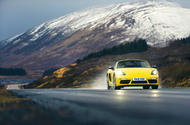Driving the North Coast 500 is adventurous at the best of times, let alone in a soft-top sports car
The North Coast 500 is not for the faint-hearted – especially when you’re driving it in the middle of a maelstrom in a convertible Porsche
Driving the North Coast 500 in the winter was meant to be an adventure, but perhaps not quite as adventurous as this could turn out to be.
We arrive in Inverness with the far north of Scotland under a severe weather warning and conditions bad enough to have earned a name. This is going to be the Porsche Boxster T versus Storm Brendan.
I’ve never really held with the idea that driving for fun is a seasonal activity, or understood why so many interesting cars get tucked up for the winter. Many of my most memorable journeys have involved miserable weather, introducing another challenge to those of car and road. The minimalist Boxster T is particularly well suited to such an austere adventure, combining almost all of the Boxster’s chassis-sharpening options with the basic 296bhp 2.0-litre flat-four turbocharged engine and – in this one – a six-speed manual gearbox.
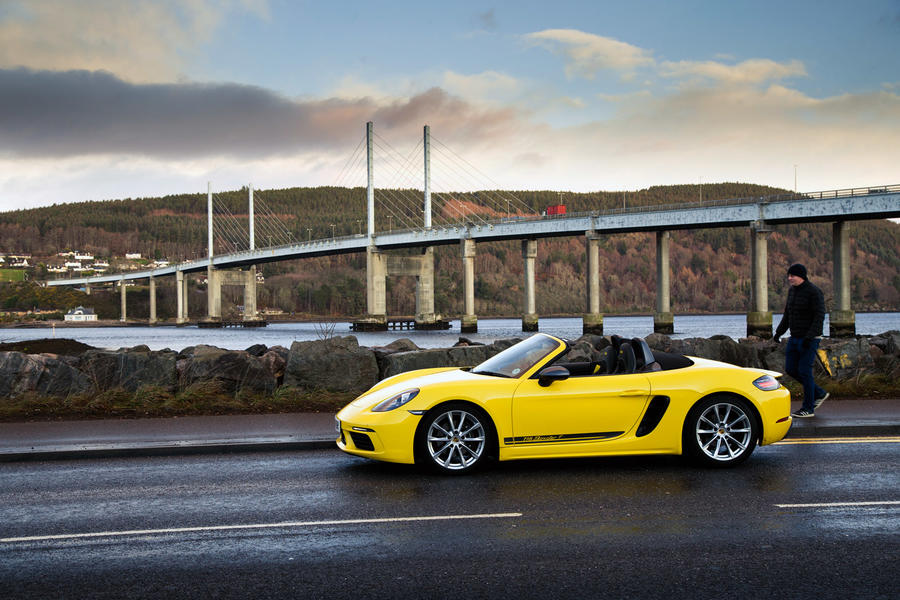
The other motivation is to experience the North Coast 500 in what should be its purest form. Since it was first branded as such and publicised back in 2015, this coast-hugging 512-mile loop around the historic Scottish counties of Ross, Sutherland and Caithness has become hugely popular and a feature on many automotive bucket lists. But the thousands since drawn to drive and ride it have also created a marked increase in traffic during the summer, sometimes causing congestion on the often narrow, single-track roads and even bad feeling among locals. Hopefully that won’t be a problem during an amber weather alert in January.
Calm before the storm
It’s an early start from Inverness. Photographer Luc Lacey has done the NC500 before, he and Richard Webber looping it in a Fiat 500 in 2017 on a three-day schedule that he says turned out to be pretty tight. A potential problem already, then, as I’ve allowed just a day and a half.
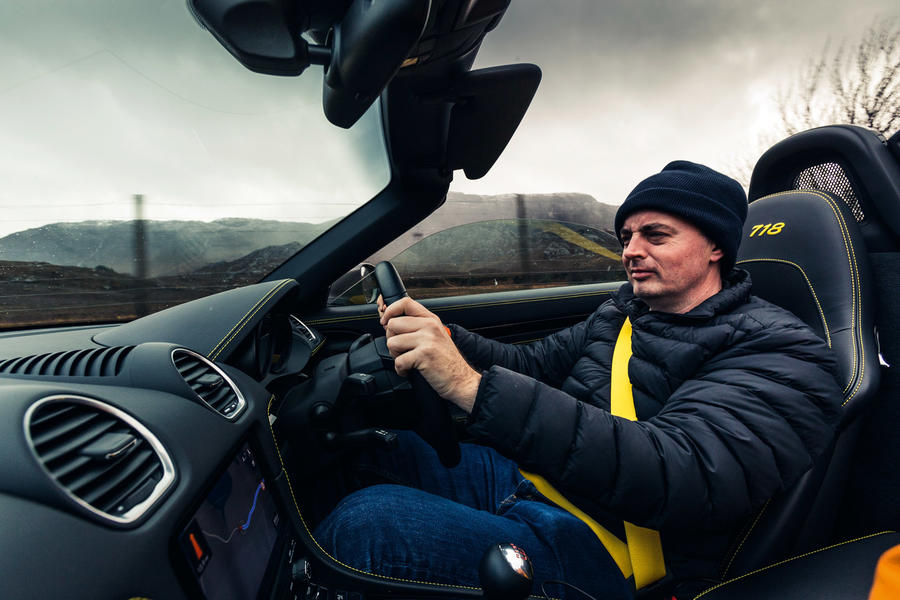
The weather is mild enough to start with the roof down, the Boxster’s combination of seat heaters, wind deflector and an effective heater keeping the cabin temperate even with the thermometer reporting 5deg C. The scenery starts gentle – rolling rather than rugged – and with no rain and little wind I’m actually wondering if taking up Porsche’s offer to switch the Boxster to winter tyres wasn’t excessively cautious.
Muir of Ord is where the climatic adventure starts. Once on the A835 and heading west, traffic drops right off; frequently there are five minutes or even longer before seeing other vehicles. The woods that flank the road start to drop back as we climb into more angular terrain, the sort of Highland scenery chosen for shortbread tins. It’s also starting to feel gustier, with some serious steering input required to keep the Boxster on track.
Stopping next to the bleakly beautiful Loch Scaven reveals just how windy it is, and Lacey struggles to stand upright as he fights his way to a vantage spot with camera gear. Driving forwards and backwards for pictures delivers the revelation that doing 50mph in a roof-down roadster with a 50mph tailwind turns the cabin almost perfectly calm. It’s like being in the eye of a storm, although there is a 100mph buffeting the other way.
Porsche’s recent announcement of the 4.0-litre 718 GTS might have thrown the perceived failings of the flat four into sharper relief, but there’s still plenty to like about this engine. It never tries to hide the fact it’s turbocharged, with a boosty delivery that makes it feel exciting and quicker than it is. But there’s also an abundance of mid-range that’s well suited to roads such as this, with plenty of immediate urge even cruising in sixth. Past Strathcarron, where the road narrows to one lane with passing places, average speed stays respectable.
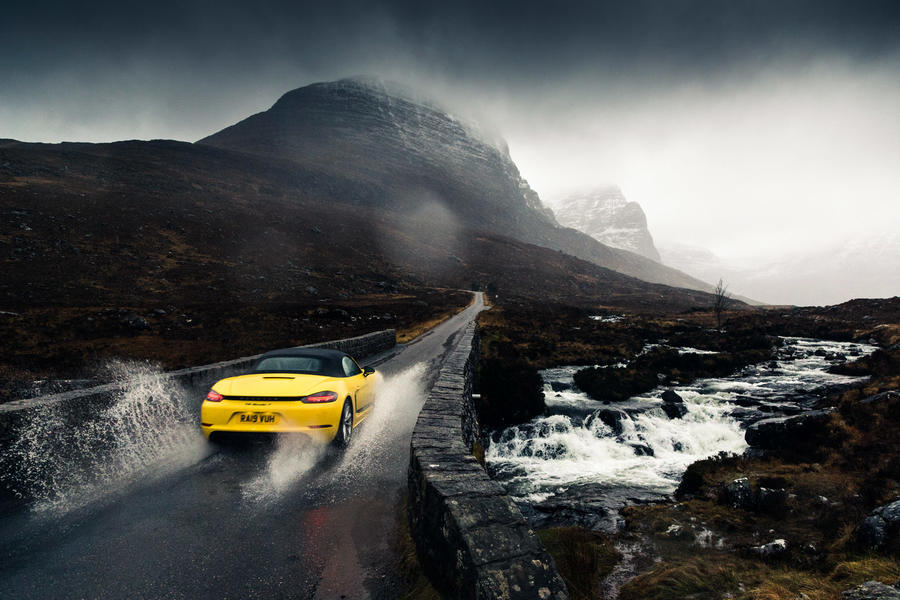
Not for long, though. The weather gets rapidly worse, the rain hard enough to defy the best efforts of the wipers’ full monsoon setting to clear the screen and the sky – before 11am – twilight dark. Then at Tornapress it’s time to turn off the A896 onto a road that looks more like a driveway than a thoroughfare, and past a sign that reads ‘Road Normally Impassable in Winter Conditions’. To emphasise the point, a snowplough appears in the other direction, its driver clearly surprised by the prospect of a bright yellow sports car.
This is the Bealach na Bà, or Pass of the Cattle, which cuts across the mountains of the Applecross peninsula to reach the coast. It was opened in the 19th century and features the steepest ascent of any road in the UK, a 2045ft summit and an impressive crop of Alpine-style hairpins on the way to the top. Normally it’s the sort of location on which photographers would happily spend days, but as the Boxster climbs so the angry clouds seem to come down to meet us. Before long we’re travelling through a soupy greyness with visibility well under 100 yards. By the time we reach the top we’re travelling between tall snowbanks, with the Porsche’s stability control light strobing as even the season-appropriate ContiWinterContact tyres struggle to find grip.
Progress is slow and careful, especially on the long descent, and plans for a lunch at Applecross are nixed by the realisation there are now only four and a half hours of daylight left. The Boxster isn’t even the most adventurous vehicle to have made it here today – massive respect to whoever has beaten us here in a Tesla Model 3, which is charging through an extension lead outside the inn.
The storm is still on top of us, the Boxster’s cabin snug beneath the fabric roof but with savage squalls and near-horizontal rain limiting the view of what should be some of the finest scenery in Scotland. Inclement-weather drivers often take five or more days for the full NC500, packing it with stops and detours. But in the sodden conditions there’s no sense of loss in keeping rolling, covering pretty much every point of the compass on the long loop around Gairloch and Poolewe.
Four hours after leaving the A835 we rejoin it, having covered 160 miles. The direct route would have added just 19 to the odometer. There’s a slightly surreal moment shortly afterwards as a Morgan 3 Wheeler appears out of the greyness heading in the other direction, its driver wrapped in layers of weatherproofing. It turns out to be a German journalist doing an even more adventurous Highland drive story, although he is being followed by a Range Rover support car. Ullapool feels like a big city, with a sizeable CalMac ferry loading for what will doubtless be a storm-tossed run to Stornoway. After 200 miles the Boxster still has nearly half a tank left – the trip computer reporting an impressive 29mpg – but it’s still wise to take the opportunity to brim it with super unleaded.

There’s no time for more than a rushed sandwich before getting back in the saddle – and facing up to an ethical dilemma. Lacey is keen to take a picture at the spectacular, curved Kylesku Bridge, but following the full NC500 route to get there means another coastal detour past Lochinver, meaning it will be night when we reach the bridge. We opt to cut the loop out, saving 25 miles and an hour’s travelling but turning this into the NC475. On the plus side there’s still enough grey light when we reach the bridge for Lacey to take a spectacular shot lit by the Boxster’s headlights.
But now we’re out of light and – to no great surprise – it is raining hard again. The rough plan called for us to be considerably farther around the route before stopping, meaning a cautious drive north over an A-road that lacks cat’s eyes or painted markings, and is barely discernible from the moorland it traverses. Out-of-season accommodation in Durness turns out to be limited and, after a (brief) debate about staying in a backpacker’s hostel, we opt to push on for another two hours to get to Thurso. I know from previous trips that the bleak northern coastline is frequently spectacular, but we don’t see any of it beyond the blackness.
Thurso is short on frills but provides everything we need: dinner, bed, breakfast and another tank of 98 octane for the Boxster. As dawn breaks we’re already rolling, heading for a stop that isn’t on the official NC500 route but which is well worth a brief diversion. Dunnet Head, about five miles off the A836, is the northernmost point on the British mainland and one of the most bleakly beautiful spots I know. Early on a cold Thursday morning we have it to ourselves – the lighthouse is unmanned – with clear views across the savage-looking sea to Orkney. There’s another, briefer, pause at John O’ Groats, more famous than Dunnet Head because of its greater distance from Land’s End but with considerably less rugged charm.
This leaves only the small matter of returning to Inverness, with the NC500 following the A99 and A9 down the east coast. It is still handsome country, but the views are less distracting than yesterday’s and the roads are wider, faster and better-sighted. With higher speeds and chassis loadings, I’m finding mild frustration with the winter tyres for the first time – they definitely take the edge off the Boxster’s normally searing front-end responses. There’s also the novelty of other road users, the Porsche’s overtaking pace tested by a succession of lumbering trucks.
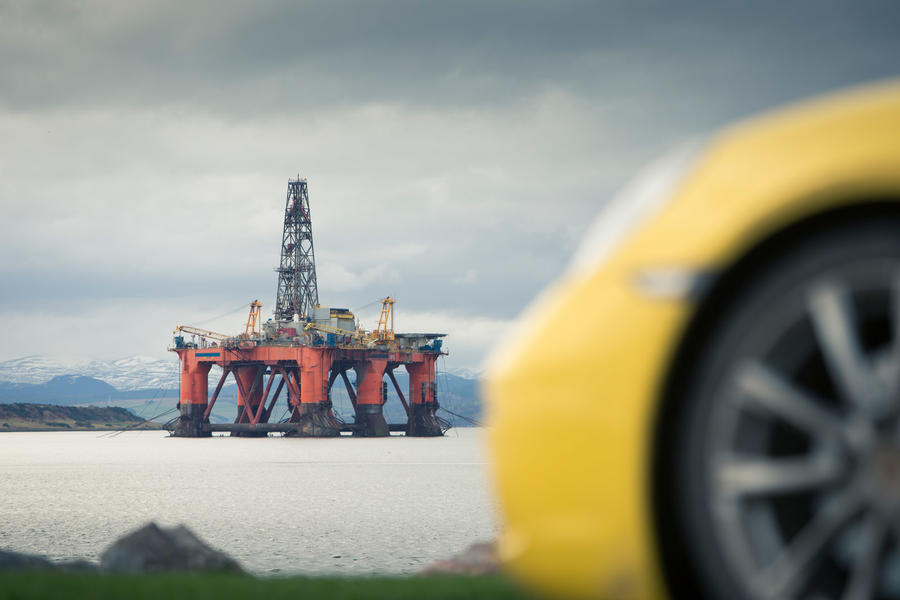
There’s a final stop at Invergordon to take in an impressive view, if not exactly a scenic one, of a dozen or so oil rigs in the Cromarty Firth waiting to be scrapped. Scotland’s energy business is shifting fast – we caught distant glimpses of one of Europe’s biggest offshore wind farms farther north; maybe next time this drive will be in an EV running on locally harvested electrons.
The shadow of the spectacular Kessock Bridge seems like a good place for an end-of-journey shot, across the water from Inverness but with the Porsche showing off its salt-encrusted flanks. Although an unlikely choice for a drive through a storm, the Boxster T has acquitted itself brilliantly – even when the weather has allowed few chances to demonstrate much of its performance or dynamic talent. It’s proof that rain doesn’t need to stop play. This hasn’t been a particularly glamorous loop of the North Coast 500, and certainly not a leisurely one, but it has been a proper adventure.
North Coast 500 alternatives
Beach-riddled coastlines, Tolkienesque terrain and charming waypoints linked by fantastic roads. For the most part, the North Coast 500 is all of those things. But its runaway popularity, in the summer months at least, means roads used to hosting more cows than cars have become busy with drivers, riders (both pedal and petrol-powered), caravanners and campers, each with different paces and priorities. And that’s not all: single-track stretches regularly cork the bottle, some of the roads and landscapes are pretty ordinary and the route is arguably too long. But fret not, for there are countless undiscovered circuits for you to enjoy. Here are our favourites, each paired with the perfect set of wheels.
Scottish Borders 55, Lotus Evora GT410 Sport

Few relish their daily commute, but the familiarity of a decade spent shuttling between Edinburgh and the Scottish Borders resoundingly failed to breed my contempt. This compact but varied loop explains why, and the GT410 Sport’s dynamic versatility makes the ideal companion.
We begin in Selkirk beneath Sir Walter Scott’s statue then follow a lazy hillside meander above the equally mellow River Tweed before passing Scott’s baronial pile of Abbotsford and turning north at Galashiels.
This stretch of the A7 is exceptionally quiet and undeveloped for a single-digit A-road – and even quieter since the opening of the Borders Railway in 2015. The soft, rolling, agricultural terrain synonymous with the region yields swift, easy radiuses and well-sighted straights where the supercharged V6’s ready throttle, heady punch and raucous yammer would delight.
I’d take the Evora in optional touring spec for gentler Bilstein dampers and Michelin Pilot Sport 4S rubber to better suit the next section, which is tighter, rougher and wilder. After briefly entering Midlothian we break onto the skinny B7007 that quickly snakes up the Moorfoot Hills for panoramic views across Edinburgh and beyond, before disappearing southward into a cosy valley that’s more akin to Highland terrain.
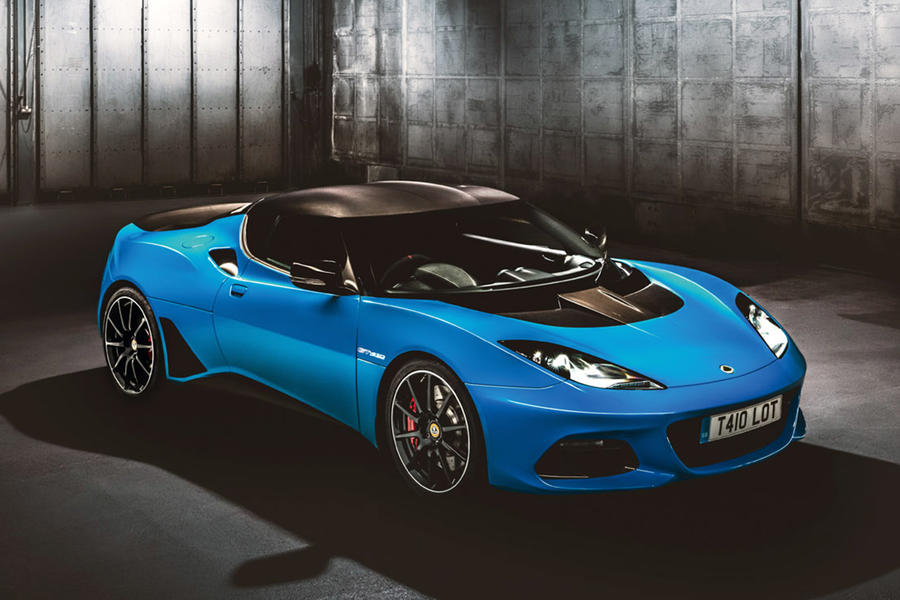
The frost-crumbled Tarmac would barely bother the Evora, allowing full enjoyment of its direct steering and obliging chassis on the sharp corners that squiggle beside Leithen Water. It’s an imperfect, real-world back-road treat.
At Innerleithen it’s left onto the A72 (not before an ice-cream at Caldwell’s) for another languid Tweed-side stint. The main road peels from the river at Caddonfoot, allowing a final indulgence on the ducking, diving and downright beautiful A707.
Past the idyllic Yair House, a string of flowing uphill chicanes leads into a slippery, canopied section with a nasty tightening left before the intriguing remains of the Bernat Klein Studio peak through the trees. Then it’s back into Selkirk to finish – or repeat. Richard Webber
The Brittany There and Back Again, Citroën 2CV

Can a loop be a loop if you use the same road there and back? Of course, given you use the other side of the road for the return. It’s just a rather narrow loop. And, in my case, short, at just 7.6 miles all in. And I’ve only done it in a Citroën 2CV, but it meant everything to me.
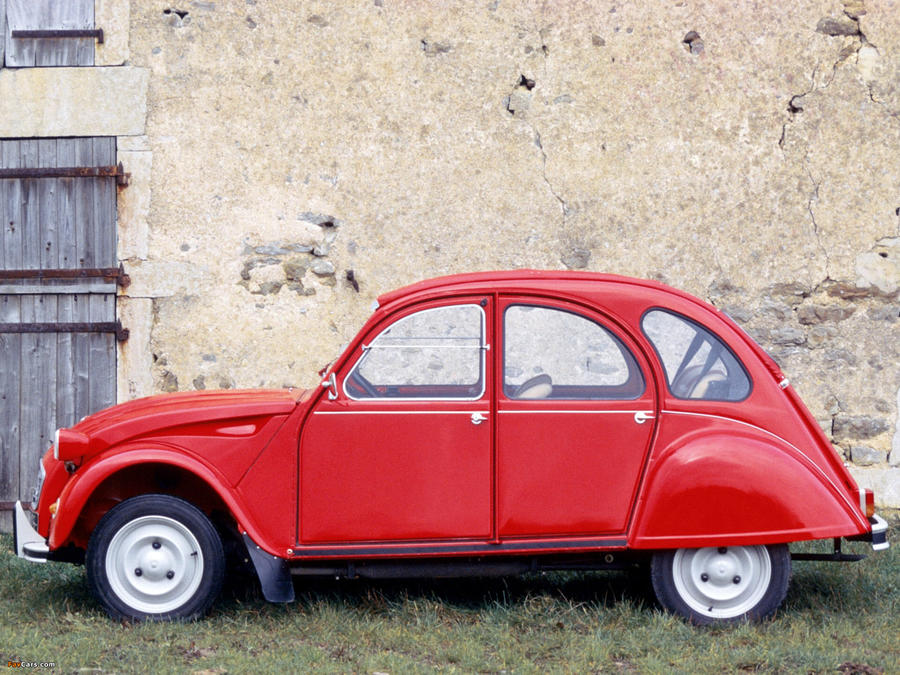
Living in the claustrophobic confines of Jersey, my father bought a tiny cottage in Brittany where we’d spend our summers and said 2CV lived. Each morning one of us would take the 2CV to the boulangerie to get bread. And save one junction, the idea was to do the whole trip flat. The only problem was a corner by a big house. It was easy on the way home because it was slightly uphill; on the way there it required more courage than I had. Both brothers reckoned they’d done it flat. I never did. And nor, I am sure, did they. Andrew Frankel
Peak District Pass Master, Ariel Nomad
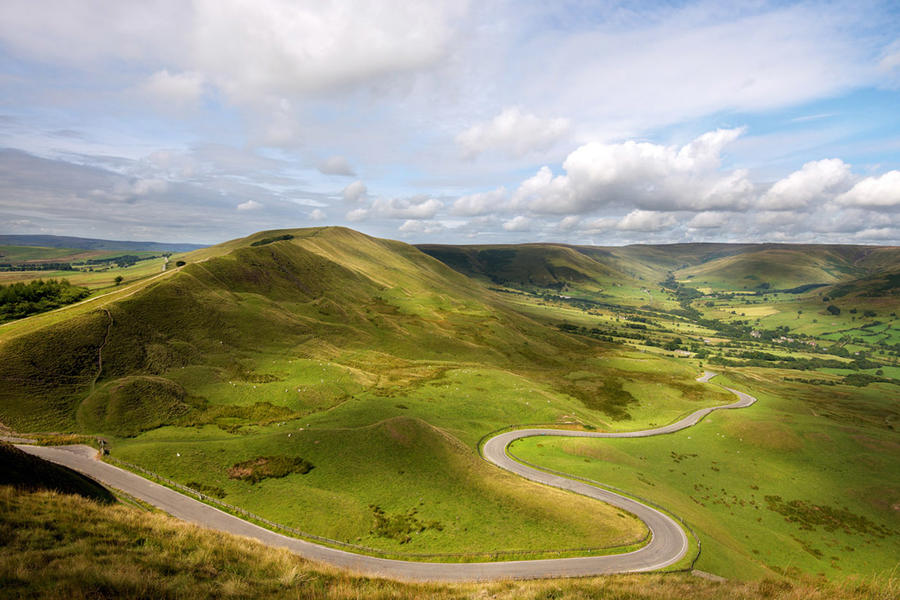
Doing this job for what is approaching two decades has taken me a long way in search of great backdrops for worthy cars many times, so I was delighted to find some comparably epic, scenic roads closer to my Midlands home. To those who’ve never discovered it, I humbly commend the Peak District.
My route isn’t quite a loop but is none the poorer for it. It joins up several well-known passes between Yorkshire and Lancashire, on the lovely lower back of the UK: Woodhead, Snake, Cat and Fiddle. Who doesn’t want to drive those?

Start on the Woodhead (A616) at Midhopestones and head south on the winding Mortimer Road past the superbly named village of Wigtwizzle. When you hit the Snake Pass (A57), head west to Glossop then south via main roads to Buxton, ending up on the Cat and Fiddle Pass (A537) running west again towards Macclesfield. Then, if you’ve time, turn around to explore the roads around Warslow and Hulme End to the south-east.
You could do it all in a longish spring day. There are one or two speed cameras and it’s narrow in places, so you won’t want to do it in anything wide or fast. And you want a widescreen view. I’d pick an Ariel Nomad, and perhaps a good coat and some thick gloves. Matt Saunders
The South Hams 40, Volkswagen Up GTI

My formative driving years were spent in Devon, so I’m heading there for a loop that plunges through the heart of the picturesque South Hams.
Start by heading west on the A379 from Plymouth, following it through the pretty market village of Modbury, the other side of which is a quick right-left-right kink with a wicked depression that, in my mind’s eye, has always made it a mini Eau Rouge (watch the dry stone wall on the exit).
From there it rollercoasters its way to Churchstow, where you hang a left onto the A381 and its heart-lifting elevation. Next it’s the bohemian delights of Totnes, after which you head east along Plymouth Road to Avonwick, where the fast and flowing A3121 funnels you back onto the A379 at Ermington.
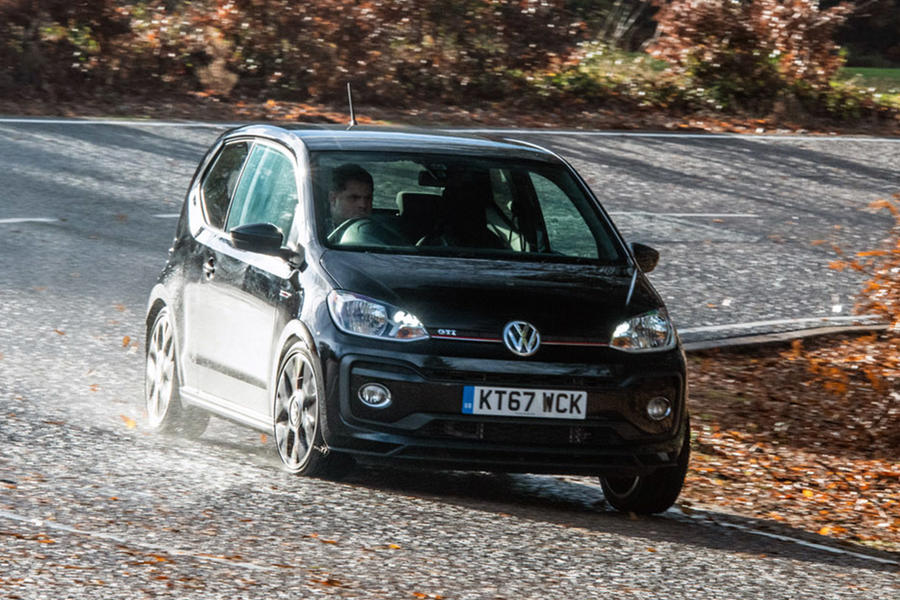
The car? Well, a blast along these typically high-hedged and sinuous Devonshire byways fills me with nostalgia for the lightly modded 1979 Mini 1000 of my youth, so a modern-day equivalent such as the Volkswagen Up GTI should do the trick. James Disdale
READ MORE
Porsche: No electric 911 until at least 2030
New Porsche 911 Turbo S packs 641bhp for 205mph
Modern-day 914 on the way, hints Porsche
Source: Autocar
